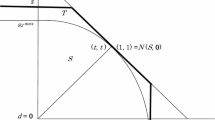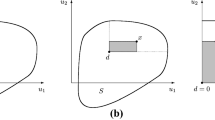Abstract
The Zeuthen bargaining model occupies a prominent place among those theories of the bargaining process that have been formulated and expounded by economists. Its solution to the bargaining problem is essentially economic, since invariant utility functions based on economic factors alone determine the outcome. However, this paper shows that a necessary condition for reaching the Zeuthen solution (shown by Harsanyi to be mathematically equivalent to the game-theoretic solution of Nash's theory) is that bargainers initially take up positions on opposite sides of the outcome that maximizes their utility product. Whether utility functions are mutually known or unknown, inherent in the bargaining situation itself is the requirement that bargainers be at least initially uncertain as to each other's subsequent concession behaviour. With uncertainty, von Neumann-Morgenstern rationality implies that each bargainer would make an initial demand that maximizes the expected gain from holding fast. Therefore, even if Zeuthen's concession criterion should subsequently dictate concession behaviour, expected utility maximization within the context of subjective uncertainty may well yield initial demands that are inconsistent with reaching the Nash-Zeuthen solution. Finally, a general methodological conclusion that emerges from the analysis is that, since the bargaining process necessarily proceeds from a context of subjective uncertainty, greater emphasis needs to be placed on its role as a device for affecting expectations.
Similar content being viewed by others
References
R. L. Bishop, ‘A Zeuthen-Hicks Theory of Bargaining’, Econometrica 32 (1964) 410–417.
J. G. Cross, ‘A Theory of the Bargaining Process’, American Economic Review 55 (1965) 67–94.
L. Foldes, ‘A Determinate Model of Bilateral Monopoly’, Economica 31 (1964) 117–131.
J. C. Harsanyi, ‘Approaches to the Bargaining Problem Before and After the Theory of Games: A Critical Discussion of Zeuthen's, Hicks', and Nash's Theories’, Econometrica 24 (1956) 144–157.
J. C. Harsanyi, ‘On the Rationality Postulates Underlying the Theory of Cooperative Games’, Journal of Conflict Resolution 5 (1961) 179–196.
J. C. Harsanyi, ‘A Simplified Bargaining Model for the n-Person Cooperative Game’, International Economic Review 4 (1963) 194–220.
J. C. Harsanyi, ‘Bargaining and Conflict Situations in the Light of a New Approach to Game Theory’, American Economic Review 55 (1965) 447–457.
J. R. Hicks, The Theory of Wages, Macmillan and Co., London, 1932.
J. F. Nash, ‘The Bargaining Problem’, Econometrica 17 (1950) 155–162.
J. F. Nash,‘Two-Person Cooperative Games’, Econometrica 20 (1953), 128–140.
J. Pen, ‘A General Theory of Bargaining’, American Economic Review 42 (1952) 24–42.
J. Pen, The Wage Rate Under Collective Bargaining, Harvard University Press, Cambridge, 1959.
E. Saraydar, ‘Zeuthen's Theory of Bargaining: A Note’, Econometrica 33 (1965) 802–813.
F. Zeuthen, Problems of Monopoly and Economic Warfare, G. Routledge and Sons, London, 1930.
F. Zeuthen, Economic Theory and Method, Longmans, Green and Co., London, 1957.
Author information
Authors and Affiliations
Rights and permissions
About this article
Cite this article
Saraydar, E. Uncertainty, the bargaining problem, and the Nash-Zeuthen solution. Theor Decis 1, 309–319 (1971). https://doi.org/10.1007/BF00139573
Issue Date:
DOI: https://doi.org/10.1007/BF00139573




